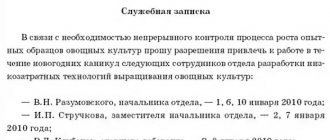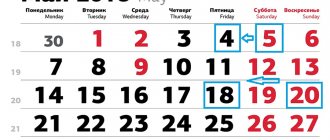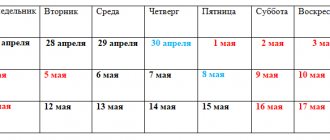When we celebrate
Each month of the year has a different number of working days.
According to the standard calendar of a five-day working week, in 2020 there are 17 working days in January, and 23 in July. How is payment made on holidays under the Labor Code? Does a large number of days off mean that wages for January will be accrued in a smaller amount, or should wages for holidays be deducted? The answers to these questions are contained in Article 112 of the Labor Code of the Russian Federation. IMPORTANT!
In connection with the situation with COVID-19 and the publication of Presidential Decree No. 206 of March 25, 2020 “On declaring non-working days in the Russian Federation,” the employer is obliged to provide employees with paid days off. If it is possible to switch to remote work and the employee does not mind, then an agreement must be concluded. If there is no opportunity to work remotely, and the employer forces you to write an application for leave at his own expense or for a part-time transfer, he is breaking the law, the employee has the right to complain to the State Labor Inspectorate. As for the payment for these days, even if the employee does not actually work, but is at home, this cannot in any way affect the amount of his salary due to the issuance of a presidential decree. These days are subject to payment in full, as if the employee was at his workplace and performing his work duties.
Non-working holidays on the territory of Russia, in accordance with Art. 112 of the Labor Code of the Russian Federation are:
| January 1-6 and 8 | New Year holidays |
| Jan. 7 | Nativity |
| February 23 | Defender of the Fatherland Day |
| March 8 | International Women's Day |
| 1st of May | Labour Day |
| 9th May | Victory Day |
| 12 June | Russia Day |
| November 4 | National Unity Day |
Subjects of the Federation have the right to designate additional holidays by separate laws. In the Republic of Tatarstan, for example, local law dated February 19, 1992 No. 1448-XII on the territory of a constituent entity of the Federation additionally established the following regional days off:
- Republic Day of Tatarstan - August 30;
- Constitution Day of the Republic of Tatarstan - November 6;
- Eid al-Fitr is a floating date, in 2020 it is May 24;
- Eid al-Adha is a floating date, in 2020 it is July 31.
Work on these days is prohibited, except in cases provided for in Art. 113 of the Labor Code of the Russian Federation, which we will consider below.
Are holidays deducted from your salary? The presence of non-working holidays, regardless of their number, is not a reason for reducing the amount of remuneration if it is established on the basis of the official salary. Thus, both for May, due to holidays, which has 17 working days, and for July, which has 23 working days, the salaried employee will receive the same amount.
How do you pay?
The specifics of remuneration for work in personal time are determined by Art. 153 of the Labor Code of the Russian Federation. Any specialist can be hired to work if he is not included in the category of prohibited workers.
But each employee carries out different types of professional activities. Such differences lie in the specifics of the work performed. Accordingly, the payment principles differ from each other.
General provisions established the following forms of assessment and payment for work:
- Piecework form. In this case, the worker receives money for a specific volume completed, for example, for the number of products manufactured.
- Hourly payment. It lies in the fact that the calculation takes into account the time during which a person was at his place of work and performed his functional duties.
- Fixed salary for position. A person receives a certain amount for periodically staying in his place and performing the established minimum duties.
The main principle of payment, which applies to all categories, is to make payments in double size, based on the amount taken per unit of calculation.
Another mandatory condition is to perform your duties in your personal time, since in companies with a shift work schedule, working hours may fall on a day off.
With piecework wages
Article 153 of the Labor Code of the Russian Federation established the principle of double pay in personal time for all employees.
This also applies to those who are paid on a piece-rate basis. Its essence lies in the fact that a person receives money for the amount actually completed. The length of time spent on this is not taken into account.
This principle applies to those specialists whose activities can be assessed on a quantitative basis, for example, an order picker, a turner, a digger, a timber feller.
For such and similar positions, unique units of calculation are established. Examples include the number of orders collected, parts manufactured, and land area processed.
If such a specialist performs work on his own time, the basis for payment calculations will be the double unit of the established calculation.
For time-based wages
The time-based salary principle applies to most positions. It lies in the fact that the employee receives money not for the actual volume, but for the time spent at his place of work, during which he is obliged to perform his functional duties.
This principle is characterized by the accounting of labor time. For workers in this case, the cost of a unit of time is determined, which can be one hour or a day. This also includes incentive payments that are made if the specialist is conscientious.
But the principle of double payment applies in this case as well. That is, if an employee went out on his personal time, the calculation will be based on the double cost of a unit of time, and the final result will depend on the total duration of functioning in his personal time.
How to get people to work on a holiday
IMPORTANT!
Regarding the organization of work on non-working days due to the COVID-19 situation, please read our recommendations.
To involve an employee in performing work duties on a holiday, it is necessary to obtain his consent. It is possible to work on holidays if:
- suspension of work is impossible due to production and technical conditions (continuous production cycle);
- the organization serves the needs of the population (public transport);
- urgent repairs or commissioning are required;
- there was a need to carry out previously unforeseen work, on which the normal functioning of the organization depends in the future.
Without consent, the employee will be called to work on holidays only to prevent emergencies and accidents and to eliminate the consequences of such events. Whether holidays are paid with salary is established by labor legislation. An employer does not have the right to hire employees for free. This is a direct violation of workers' rights.
Clarifications to Article 153
The legislation provides clarifications to the usual articles and bills.
Changes are made in accordance with the session or order, which is a clarification to a previously adopted law. Labor legislation fully controls all areas of the relationship between employees and company management. The clarifications concern different parties and include the following points:
- When a citizen enters a job, he signs an employment contract, which explains all the nuances, responsibilities and powers of the activities of a particular employee. The prescribed amounts are minimal, payments are increased by joint agreement, securing compensation in a collective agreement.
- Compensation is a mandatory condition for calling an employee during non-working hours. The employee independently chooses incentive measures. The collective agreement stipulates the amounts of payments.
- The collective agreement provides for loyal benefits for all citizens who go to work on their day off; The document regulates payments and amounts.
- Part one of Article 153 establishes a minimum payment, which is added to the salary when the schedule is revised. Athletes and artists receive compensation in accordance with the standards. The only difference between an ordinary employee and an artist is the fact that a local regulatory act is drawn up: artists and creative people sign the document individually.
Article 153 has clarifications that relate to different areas of human activity, which affects the amount of the required salary due to the specifics of their activity.
Restrictions for certain categories
It is prohibited to involve minors (Article 268 of the Labor Code of the Russian Federation) and pregnant women (Article 259 of the Labor Code of the Russian Federation) in performing labor duties on holidays.
For some categories of employees, it is allowed to perform work duties on holidays only if there is no prohibition for health reasons. It is mandatory to obtain consent from employees, even if the exit is due to an emergency situation. These employees include:
- disabled people;
- women with children under three years of age;
- parents raising a child without a spouse, guardians of children under the age of five;
- parents, guardians of disabled children;
- employees who care for a family member based on a medical certificate.
Compensation
Articles 152 and 153 of the Labor Code of the Russian Federation regulate the issues of employee leave on weekends, as well as the procedure for compensation from the employer. Workers are offered two options to choose from:
- Increased exit payment.
- Time off according to the Labor Code.
If the employee’s return to work was accompanied by his consent in writing, then the type of compensation should be specified in it. If recruitment took place without paperwork, then employees are usually paid increased wages.
When an employee chooses compensation in cash equivalent, exit is paid double.
Calculation of payments for weekends
The calculation is made depending on the system adopted by the enterprise regarding the calculation of personnel wages:
- Piece work : the corresponding prices are used, doubled.
- Using monthly salaries with time-based payment : an additional payment is made to the employee’s official salary in the amount of the daily tariff rate.
- Time-based wages at a rate per hour or per day : the rate is doubled.
The minimum wage limit for performing work duties on rest days is established separately for the category of workers: piece workers and time workers. The type of system by which labor is paid is taken into account (by the hour, by the day, by the month). And this limit is established by the Labor Code of the Russian Federation. Additions to this system can be established by labor and collective agreements. The law does not prohibit this.
A more precise amount of payment is established according to Part 2 of Art. 153 of the Labor Code with comments, this point is reflected in the contracts:
- collective (at the enterprise it may not be concluded, it all depends on the specifics of the work);
- labor certificate (its conclusion is mandatory when hiring a person for official employment);
- a local act adopted by the enterprise.
If these acts do not provide for the above cases, payment is made according to the Labor Code of the Russian Federation. You should rely on the norms of Article 153, which indicates a double amount of remuneration for an employee’s work.
The main thing that an employee must do when choosing compensation is agreeing with the boss on its type. If, for example, a person decides to take a day off, then this issue is resolved with senior management. Otherwise, absenteeism may be considered a violation of labor laws.
It does not matter how much time a person actually worked on a holiday or day off. They must give him a whole day as compensation. The legislator proceeds from the logic of Part 3 of Art. 153 of the Civil Code of the Russian Federation, that, having gone to the place of work, the employee missed the whole day of his legal day off. But the employer is not obliged to pay for an additional compensation day!
https://youtu.be/EhaydyO7pjI
Creative category
Special rules regarding remuneration are established for the creative category. These include:
- media representatives involved in creative projects;
- organizations of citizens involved in television and video filming;
- theater troupe;
- circus communities;
- athletes (professional).
The peculiarity of their activities is that filming, performances, and concerts take place on weekends and holidays. But they are also subject to the Labor Code of the Russian Federation. Based on this provision, Art. 153, part 4 of the Labor Code of the Russian Federation establishes that increases in wages for this category of citizens on days (rest days) are also established by contracts. But labor relations are not limited to the minimum amount for paid days off.
How to calculate salary for holidays
Let's consider how to calculate wages on holidays if the employee performed his official duties on these days. For the performance of labor duties on a holiday, the employer is obliged (Article 153 of the Labor Code of the Russian Federation):
- or pay for the time worked at least double the amount;
- or provide an additional day off.
Whether holidays are counted towards the salary at double the rate depends on the employee’s decision to take or not to take an additional day off for performing work duties on a holiday.
If a day of rest is not registered, then payment for holidays must be at least double:
- piece rates - for piece workers;
- daily or hourly tariff rate - employees who receive wages based on the tariff rate;
- daily or hourly rate in addition to salary, if the work was performed in excess of normal working hours - salaried employees.
If an employee decides to take an additional day off, then the day off on a holiday is paid at a single rate. No compensation is paid for a day of rest.
The specific amount of compensation is established by the organization in an employment or collective agreement or other local act of the company. But it cannot be lower than that established in the Labor Code. 2020 is a leap year. Therefore, it has more working days and hours. An example of calculating holidays according to the new production calendar will help you understand the calculation procedure.
Amendments to regulatory documents
How the organization pays for work on a holiday is established in the labor or collective agreement, or in the regulations on remuneration. If it is necessary to make changes to regulatory documents, companies proceed as follows: after negotiations with employee representatives, an additional agreement to the collective agreement is drawn up, after which the additional agreement is sent to the labor inspectorate for registration, and then the additional agreement is presented to the organization’s employees under the signature.
If payment for work on a holiday is established in the wage regulations, then an order is issued to change it. There is no special form for such an order; the main thing is that an acquaintance sheet is attached to it, on which all employees put their signature confirming familiarization.
If the conditions for payment for a working holiday are provided for in the employment contract, then when changes are made, an additional agreement to it is drawn up.
Wording on remuneration on a holiday or day off in regulatory documents.










